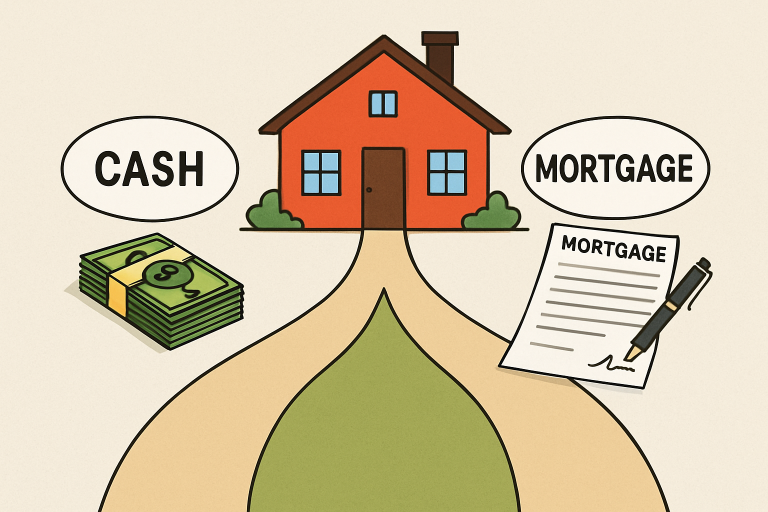Key Takeaways
- Paying cash offers financial freedom, faster closings, and stronger leverage in negotiations.
- Avoiding a mortgage saves on interest but ties up a large sum of money in one asset.
- Cash buyers forfeit mortgage-related tax deductions and may miss other investment opportunities.
- Before choosing this path, each buyer must weigh liquidity needs, investment goals, and personal circumstances.
Introduction
One of the most important considerations when embarking on the journey to buy a home is how you plan to finance the purchase. While most buyers rely on mortgages, some opt to pay cash. This approach has unique advantages and possible drawbacks that can significantly impact your financial well-being and plans. Understanding the implications of a cash purchase is essential, and working with knowledgeable professionals, like Sonoma CA real estate agents Shone Group, can help you make an informed decision tailored to your needs.
Whether you’re a first-time homebuyer or an experienced investor, evaluating the trade-offs of a cash purchase can help you determine if it aligns with your financial goals and lifestyle. There is no one-size-fits-all answer—the right choice ultimately comes down to your circumstances and long-term plans.
Advantages of Paying Cash for a Home
1. No Monthly Mortgage Payments
One of the biggest perks of buying a house outright is eliminating the need for monthly mortgage payments. This financial freedom reduces long-term stress and provides peace of mind, knowing your home is fully paid for. You’ll never risk foreclosure from missed payments and won’t be locked into decades of financial obligation. This stability appeals to retirees, investors, and anyone seeking a simplified path to homeownership.
2. Interest Savings
Paying cash means you avoid interest costs that accumulate with a traditional mortgage. These savings can add up substantially over the life of a typical 30-year loan. For example, with a $300,000 mortgage at a 4% interest rate, you could pay more than $215,000 in interest alone. By skipping the loan, you keep this money in your pocket and maximize your home investment’s value.
3. Faster Closing Process
Cash transactions dramatically reduce closing times because they bypass the lengthy mortgage approval process. Whereas financed deals can stretch to 30 days or longer, cash purchases may close in as little as 7 to 14 days. This speed benefits buyers eager to move in quickly and can make your offer more attractive to sellers who want a fast, reliable transaction.
4. Stronger Negotiating Position
Sellers frequently favor cash offers because they remove financing uncertainty. With no lender approval required, there’s less chance of the sale falling through. This creates a stronger negotiating position for cash buyers, who may secure better prices or request seller concessions more easily than financed buyers. The confidence and certainty of a cash deal often stand out in competitive markets.
Disadvantages of Paying Cash for a Home
1. Tied-Up Capital
While paying cash avoids mortgage debt, it ties up a large sum of money in a single asset. This concentration can limit your liquidity and your ability to use funds elsewhere. If you need cash for other investments, emergencies, or life changes, your money is tied up in your property rather than readily accessible in a bank account or the stock market.
2. Missed Investment Opportunities
Locking your cash into real estate means missing out on alternative investments, which may offer greater returns. Historically, the stock market has yielded higher average annual returns than residential real estate appreciation rates, especially over long periods. If your cash could generate stronger returns elsewhere, there’s an opportunity cost to consider when buying a home outright.
3. Loss of Mortgage Interest Tax Deduction
Homeowners paying a mortgage can often deduct mortgage interest from their federal income taxes—a valuable benefit, especially in the early years of a loan. Paying entirely in cash forfeits this tax deduction and could result in a higher tax burden than mortgage holders, depending on your tax situation and deductions.
4. Reduced Liquidity
Real estate is a relatively illiquid asset—converting your home back to cash requires selling it, which can take months depending on the market. If your financial situation changes and you need money quickly, accessing the funds tied up in your property might prove difficult or costly. This lack of readily available cash can be a significant drawback for buyers prioritizing financial flexibility.
Final Thoughts
Paying cash for a home comes with meaningful advantages such as freedom from mortgage payments, substantial interest savings, the ability to close quickly, and increased negotiating leverage. However, weighing these perks against potential drawbacks like reduced liquidity, tied-up capital, missed investment growth, and the loss of tax benefits linked to mortgages is important. Every buyer’s situation is unique, so take the time to evaluate your finances, consult with local experts, and determine the best route for your home purchase. Thoughtful planning will help you achieve both your homeownership and financial goals.






